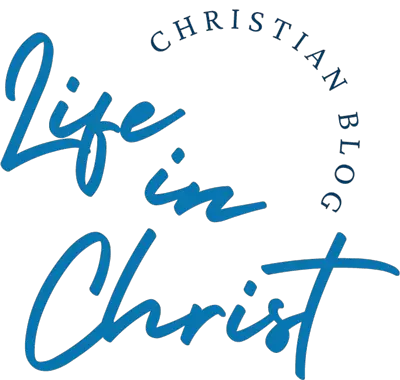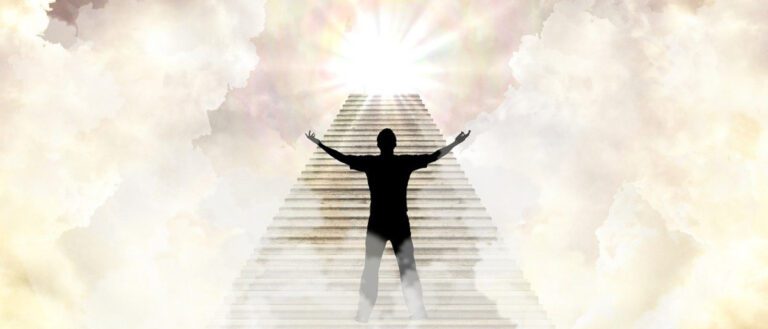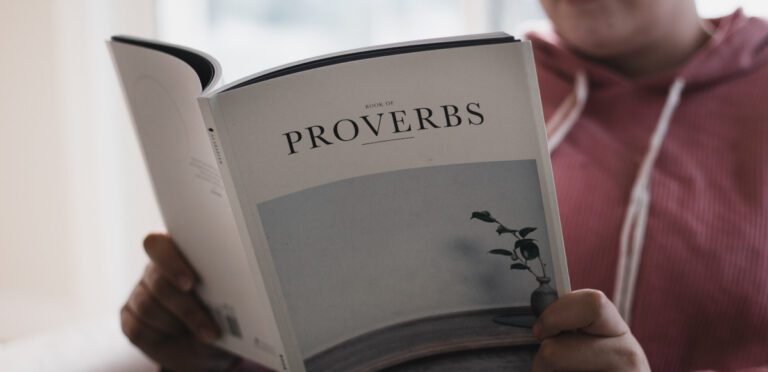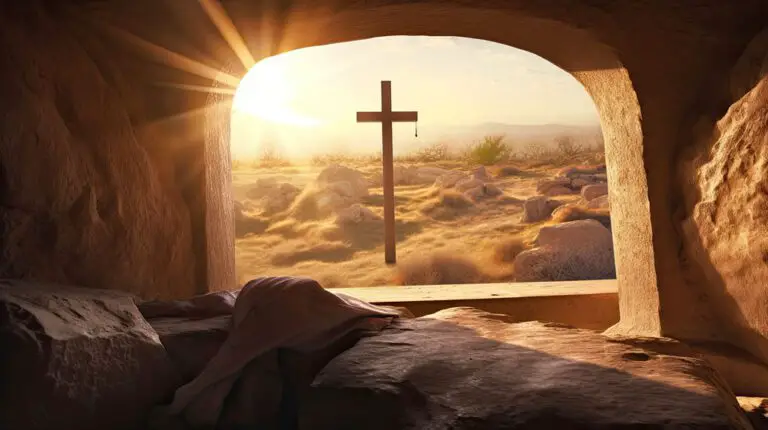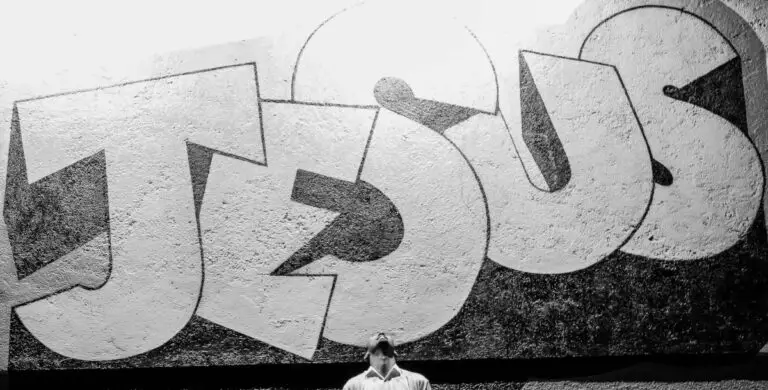It was a calm night in Egypt when suddenly cries of grief and sorrow pierced the silence.
Every household had lost their firstborn son, from the palace of Pharaoh to the homes of slaves.
This fateful night changed the course of history for the nation of Israel. As they hastily packed their belongings and left Egypt in the Exodus, a new feast was formed – the Passover.
For over 3000 years, Jewish people around the world have observed this feast. But what is the meaning of Passover? And why should Christians care about an ancient Jewish holiday?
The Origin Story of Passover – Exodus 12
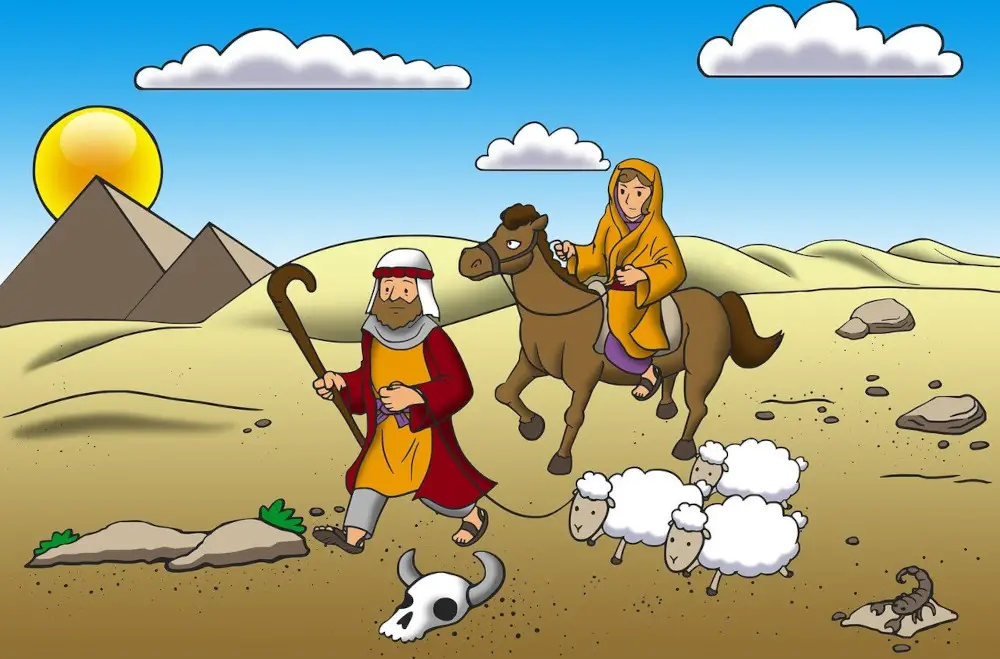
The Passover story begins in Egypt when the people of Israel were slaves under a cruel Pharaoh (Exodus 12-14).
When Moses pleaded with Pharaoh to let his people go, God sent ten plagues upon Egypt to convince Pharaoh to free them.
The final plague was the most severe – God decreed that the firstborn son in every Egyptian family would die.
To protect themselves, God commanded each Israelite family to sacrifice an unblemished male lamb and smear its blood on their doorposts.
When God “passed over” the homes marked with blood, their firstborn sons lived while Egypt mourned their dead.
Immediately after this, Pharaoh told Moses to take the Israelites and leave Egypt.
God commanded Moses and Aaron to commemorate this event every year by celebrating the Feast of Passover and Unleavened Bread.
This epic moment marked the birth of the nation of Israel. They would no longer be slaves – now they were free people belonging to God.
They remembered their swift departure by eating unleavened bread which they baked quickly without waiting for the dough to rise.
Passover celebrates how God spared them while executing His judgment upon Egypt.
The Passover Lamb
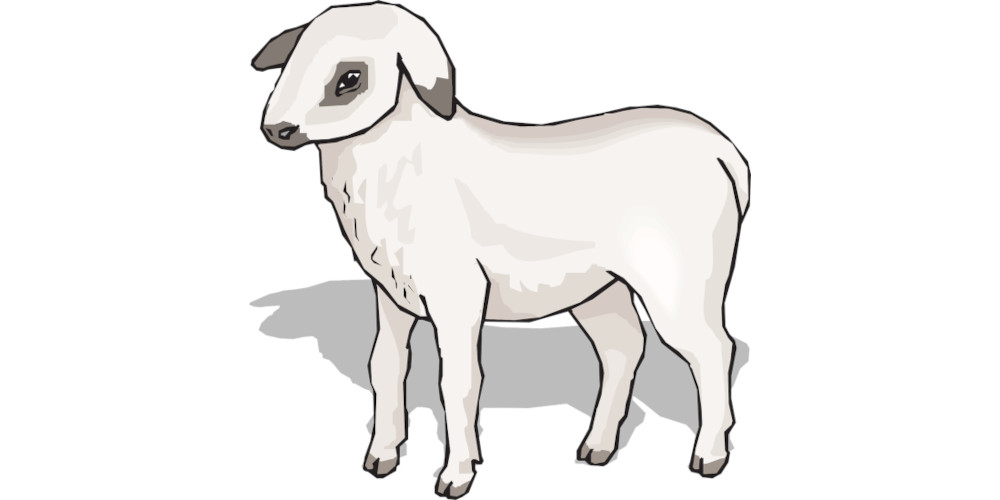
The focal point of Passover is the lamb that was sacrificed. In fact, another name for Passover is the Feast of the Passover Lamb.
Each year, Jewish families would select an unblemished one-year-old male lamb on the 10th day of the month of Nisan.
They would care for this lamb until the fourteenth day of the month when they would slaughter it at twilight.
This sacrificed lamb would then become the main course of their Passover meal.
In Exodus 12:5-6 (ESV), God commanded His people:
“5Your lamb shall be without blemish, a male a year old…6and you shall keep it until the fourteenth day of this month, when the whole assembly of the congregation of Israel shall kill their lambs at twilight.”
biblegateway.com
But why such specific instructions regarding the lamb? And what could this ritual possibly mean for Christians today?
For that, we need to fast forward 1400 years…
Jesus – the True Passover Lamb
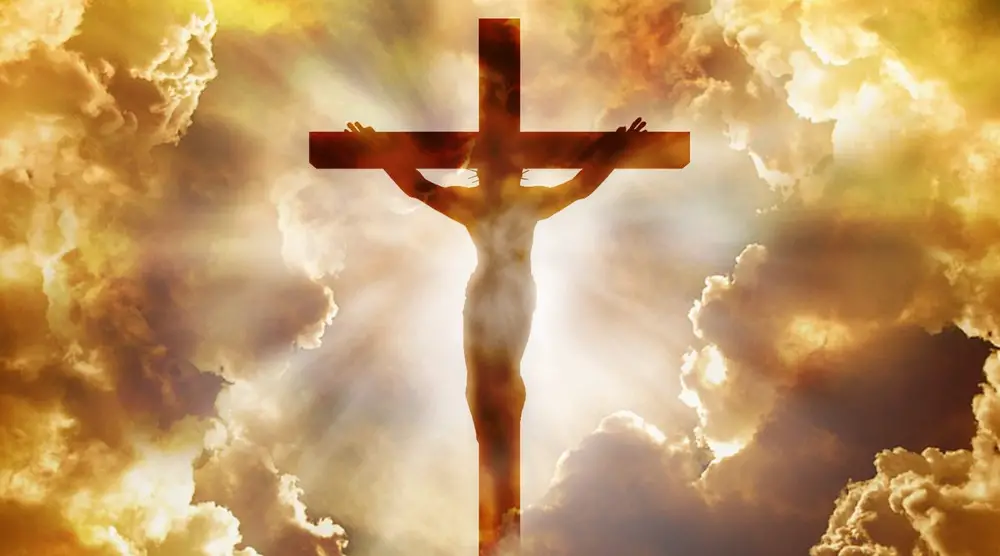
When John the Baptist saw Jesus coming toward him, he proclaimed:
“Behold, the Lamb of God, who takes away the sin of the world!”
John 1:29 (ESV)
biblegateway.com
With this declaration, John identified Jesus as the “Lamb of God” – a sacrificial lamb like that killed at Passover but with a far greater purpose.
The Apostle Paul confirmed this symbolism:
“Christ, our Passover lamb, has been sacrificed.”
1 Corinthians 5:7 (ESV)
biblegateway.com
As the ultimate and final Passover Lamb, Jesus fulfilled this required role in several significant ways:
1. He was a young, perfect sacrifice
The Passover lamb had to be an unblemished 1-year-old male lamb (Exodus 12).
Likewise, Jesus was sinless (1 Peter 2:22 ESV) and sacrificed in his prime while still a young man.
2. He died during the Passover season
In the Bible, we read how the lambs were killed yearly on Nisan 14th “between the evenings”.
Remarkably, Jesus was also crucified at the very same time when thousands of Passover lambs were being slain for this feast.
4. Not a single bone was broken
God commanded Israel: “Do not break any of the bones” of the Passover lamb (Exodus 12:46 ESV).
Astoundingly, during Christ’s crucifixion, the Romans broke the legs of the two criminals to speed up their deaths.
However, discovering Jesus had died already, they did not break his legs to fulfill this prophetic type (John 19:33, 36 ESV).
5. He redeemed people from slavery
Just as the blood from the slain Passover lambs protected the Israelites from the tenth plague, so has the blood of Jesus, the true Passover Lamb, protected us from the angel of death.
His sacrifice redeems us from slavery/bondage into freedom as children of God (Galatians 4:3-7).
6. He inaugurates a new covenant
Through his body and blood during the Passover feast, Jesus established a new covenant between God and man, just as the Passover lamb’s blood confirmed God’s covenant with Israel to be His holy people after their exodus from Egypt.
“26 Now as they were eating, Jesus took bread, and after blessing it broke it and gave it to the disciples, and said, “Take, eat; this is my body.” 27 And he took a cup, and when he had given thanks he gave it to them, saying, “Drink of it, all of you, 28 for this is my blood of the covenant, which is poured out for many for the forgiveness of sins.”
Matthew 26:26-28 (ESV)
biblegateway.com
In light of these explicit parallels, it’s obvious why John called Jesus “the Lamb of God.”
Jesus did not just die as one more innocent martyr. He specifically fulfilled and thereby transformed the meaning of Passover as the final, ultimate sacrifice for our sins.
A Prophetic Passover Meal
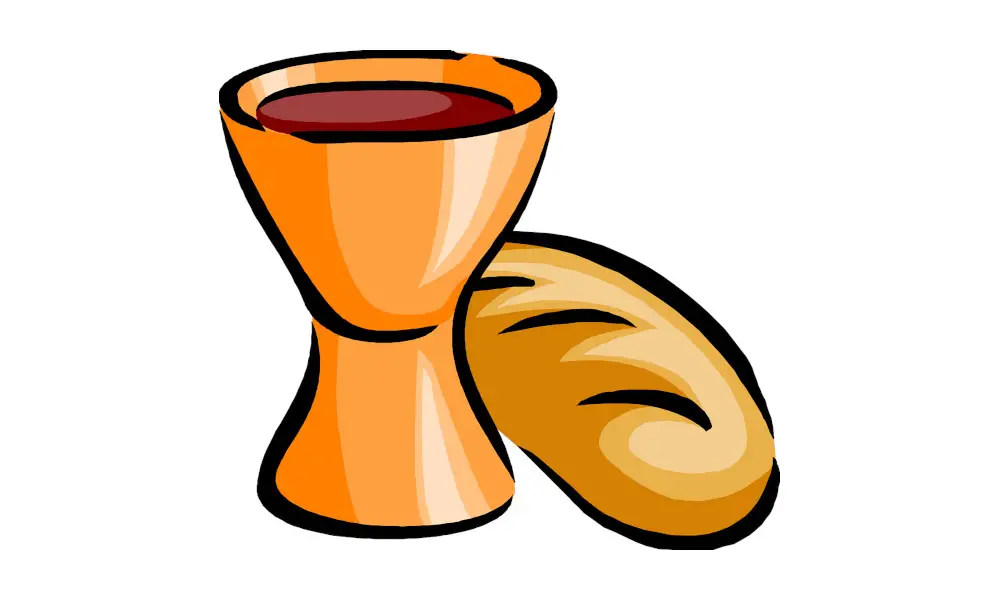
The symbolism does not stop there. Even the traditional Passover meal, called a Seder, uncannily prefigures and represents Christ’s final supper with his disciples.
As Jesus ate this meal with his disciples, the Last Supper, he surprised them by lifting the unleavened bread, pronouncing blessings, breaking it, and declaring:
“This is my body given for you; do this in remembrance of me.”
Luke 22:19 (ESV)
biblegateway.com
Then he passed around the cup of wine and stated:
“This cup that is poured out for you is the new covenant in my blood.”
Luke 22:20 (ESV)
biblegateway.com
In making these statements, Jesus revealed the greater spiritual meaning behind the physical elements of the Seder meal.
Just as the sacrificial lamb died during this feast, so too would the Lamb of God offer up his own body and blood during the Passover season to permanently atone for the sins of the world.
The Last Supper thus connects Passover’s past meaning with Jesus’ future sacrifice.
His disciples did not realize it yet, but a new covenant had been inaugurated by the Lamb who takes away the sins of the world!
Passover Today

For Christians today, Passover holds relevant meaning not just as an ancient Jewish custom but because it prophetically foreshadowed Jesus Christ’s crucifixion.
The parallels between the Passover lamb and Christ as the Lamb of God are astounding:
Both served as a substitutionary sacrifice of blood to save people from wrath and death.
The Passover lamb died instead of the firstborn son while Christ died as a substitute for sinners.
Paul explains that God made Christ “to be sin for us…so that in him we might become the righteousness of God” (2 Corinthians 5:21 ESV).
What Jesus did for us at the cross is foreshadowed in the Passover sacrifice.
Just as the blood of the Passover lamb delivered the Israelites while Egyptians perished, so are Christians spared from God’s coming judgment because we, by faith, have received Christ as Savior.
The New Testament reminds believers that:
“God has not destined us for wrath, but to obtain salvation through our Lord Jesus Christ.”
1 Thessalonians 5:9 (ESV)
biblegateway.com
By dying as the perfect Passover sacrifice for sins, Jesus delivers those who believe from the future period of judgment in the tribulation as described in Revelation 6-19.
Through the New Covenant, Messiah’s blood not only forgives our sins but also gives us a new heart so we can walk by faith in His Spirit.
The New Covenant promised in Jeremiah 31:31-34 (ESV) foretold the day when God would forgive sins and write His law upon people’s hearts by His Spirit.
31 “Behold, the days are coming, declares the Lord, when I will make a new covenant with the house of Israel and the house of Judah, 32 not like the covenant that I made with their fathers on the day when I took them by the hand to bring them out of the land of Egypt, my covenant that they broke, though I was their husband, declares the Lord. 33 For this is the covenant that I will make with the house of Israel after those days, declares the Lord: I will put my law within them, and I will write it on their hearts. And I will be their God, and they shall be my people. 34 And no longer shall each one teach his neighbor and each his brother, saying, ‘Know the Lord,’ for they shall all know me, from the least of them to the greatest, declares the Lord. For I will forgive their iniquity, and I will remember their sin no more.”
biblegateway.com
Jesus accomplished this great promise by becoming the sacrifice for sins. His resurrection gives new life and the Holy Spirit to those who believe in Him.
Eternal life was made possible because death has passed over us.
Since the wages of sin is death (Romans 6:23), Christ suffered death as a substitute through the shedding of His blood for our atonement.
All who believe in Him receive forgiveness of sins and can expect to live forever just as death “passed over” the faithful Israelites in Exodus 12.
Beyond appreciating the Passover typology, commemorating it should fill us with praise for our great Savior and Lord Jesus Christ.
The Apostle Paul proclaimed:
“7Cleanse out the old leaven…For Christ, our Passover lamb, has been sacrificed. 8 Let us therefore celebrate the festival…with the unleavened bread of sincerity and truth.”
1 Corinthians 5:7-8 (ESV)
biblegateway.com
We celebrate because we have been set free from bondage to sin. We have peace with God through the blood of His cross. And we have unspeakable hope in the resurrection unto eternal life. Hallelujah!
Every year as Passover and Resurrection Sunday approach, we are presented with the opportunity to reflect deeply upon Christ, our Passover Lamb.
When we think about the severity of God’s wrath poured out on Egypt, it should make us tremble at the thought of anyone who does not know Jesus Christ as Savior and who remains under judgment.
How then can we not open our mouths to share this good news?
Also, remembering what Jesus endured for us should make our love for Him burn within us.
Do we express in our attitudes, priorities, behaviors, and speech just what He is worth to us after all He has done?
Meditating on Jesus’ sacrifice through the lens of this prophetic feast should inspire profound awe, wonder, gratitude, love, and gospel-motivated obedience within every Christian.
Let us all drink deeply of Him through studying Passover.
Conclusion
What initially began as a night of terror for Egypt triggered a night of hope and joyous freedom forevermore for God’s people.
Throughout history since then, Passover has testified to God’s faithful promises and mighty power.
Most importantly, this ancient biblical feast proclaims a foretaste of redemption that would culminate one fateful day at the cross when Jesus cried out in victory – “It is finished!”
As New Covenant believers, we owe everything to the Passover Lamb. Just as judgment passed over Israel while death visited Egypt, so everlasting life now belongs to all those covered by the Lamb’s blood sacrifice.
The question is – have you received Jesus’ offering for your sins so you can truly celebrate everlasting Passover?
Frequently Asked Questions About Passover
Here are answers to some of the most common questions people have regarding the Passover celebration:
Q. Should Christians celebrate Passover like the Jews do?
A. There is freedom for Christians to celebrate Passover and be enriched by understanding its fulfillment in Jesus.
However, most Christians observe Communion as instructed by Jesus to remember and proclaim His death during this season.
Some Messianic Jews and some denominations like Seventh-day Adventists hold Passover Seders. Each family can decide their own convictions.
Q. If Jesus is our Passover Lamb who was sacrificed, why do some Christians observe Easter?
A. Early Jewish converts were already celebrating Passover when they believed Paul’s teaching that Jesus was the fulfillment of this feast.
However, the term “Easter” comes from the name of an ancient pagan goddess of fertility.
Many scholars believe as more Gentiles converted to faith, Easter celebrations were substituted for Passover remembrance since they occurred around the same time.
So while the origins of the name “Easter” are questionable, it has come to be the name of the occasion for Christ’s death and resurrection commemoration.
Q. Should we eat unleavened bread at Passover?
A. Unleavened bread symbolizes severing any tie with the past (slavery in Egypt) and beginning life anew after coming to God. It also represents Jesus as the sinless “bread of life”.
Eating unleavened bread at Passover is meant to remind participants of these spiritual truths.
Many churches serve unleavened bread during communion in reference to its Passover symbolism. But there’s no command that it must be eaten at this time.
Q. What is the spiritual meaning behind sacrifices like the Passover lamb?
A. The concept of sacrifice recognizes our debt of sin before a holy God that requires payment.
All sacrifices in the Bible point to Jesus on the cross making the perfect, fully satisfactory payment for sins as Hebrews 10 explains. He fulfilled what the Passover sacrifice pictured.
This does not mean animal sacrifices earn salvation, but that they foreshadowed Christ’s final redeeming work.
That’s why today sacrifices are no longer required. Jesus was the perfect sacrificial lamb!
